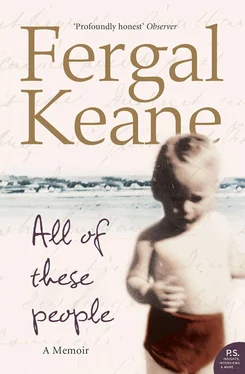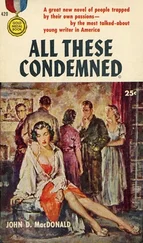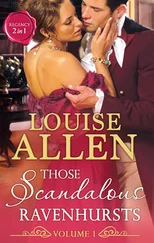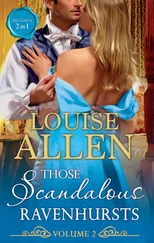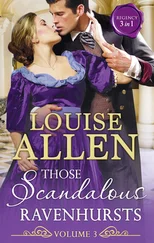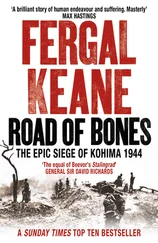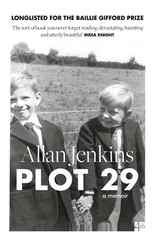My father’s career as an actor began to blossom. By the mid-sixties he was in demand on radio, television and stage. I was about six years old when I first entered a radio studio. It was the old RTE building on Henry Street in Dublin, near the riotous noise of Moore Street market with its vegetable and flower sellers, and right next to the General Post Office – still pockmarked with bullet and shrapnel marks from the fighting of 1916.
To a child’s eye Henry Street was a deep and gloomy building which smelt of floor polish and cigarettes. In the actors’ greenroom men and women lounged on sofas and chairs mumbling to themselves as they read great sheaves of paper. These were called scripts, my father explained, and you had to learn them off by heart. The actors, producers, writers, and an army of sound engineers, turned out everything from Chekhov to one of the Republic’s first soap operas, The Kennedys of Castleross, about a family in a seaside village whose tribulations – very minor by the standards of today – kept the nation entranced for years. In one of those studios I watched, mesmerised, as my father and the other actors read their lines. Never before had I seen such stillness, or concentration. As soon as the recording was done, the actors started chatting. The spell was broken. How could they go from such magic to behaving like boring adults?
Acting was always my father’s greatest love. He committed himself totally to every performance; it tormented him of course, and criticism of any kind tore into him like a steel claw. When reviews were bad he would retreat into himself as if the words were directed at him the person and not the actor on the stage; he was a man who could never divide the actor from the self. On those days he was angry and short tempered, storming out of the house at the smallest excuse.
Luckily the bad reviews were rare. As the sixties progressed he had a string of successes. He appeared as the lead in a triumphant revival – ‘the hit of 1968’ – of Dion Boucicault’s melodrama The Shaughraun at the Abbey Theatre. Movie offers started to come in. He appeared in two American films that were made in Ireland. He started to talk about Hollywood. After all, there other Irish actors like Barry FitzGerald and Milo O’Shea who had already blazed the trail. My father’s first film appearance was in Underground, set in France during the Second World War. There was a role for a child in this film and my father arranged an audition for me. When the day came I was taken down to the National Film Studios in County Wicklow. But I was seized by terror and ran out of the film company offices. A few months later I was again convulsed by stage fright during a school play. I knew the words but my throat went into spasm from fear. Any temptation to follow my father onto the stage disappeared in those agonising moments.
Ireland was changing now. Playwrights such as my Uncle John B. Keane and Brian Friel were writing an alternative narrative to that offered by Church and State. Éamonn and Maura relished the new atmosphere, the challenge to the old order that was being thrown up. My awareness of the wider world was shaped by my parents’ non-conformism and, in both of them, a blazing sympathy for the underdog in Irish life. One of my earliest memories is of my father inviting in a group of travelling people – the eternal outcasts of our society – and sitting them down to tea.
I doubt if he checked whether we had the food to give them, and he certainly wasn’t the person who cooked, but it was an important example for me. It was the gesture that mattered. Many other doors on our street would have been slammed in their faces. Years later, when I read Nadine Gordimer writing about apartheid in South Africa, there was a phrase which reminded me of my parents. It was the duty, said Gordimer, of every person faced with injustice to make the ‘essential gesture’. It would be different in every life. Some would go to jail for their beliefs; others would do something as small as writing a letter to their local newspaper, or signing a petition. But what gave the gesture its power was that it came from the heart.
My parents filled their lives with ‘essential gestures’. They were people of the heart. When she was teaching Keats’s ‘Ode to a Nightingale’ my mother went and dug out some library books on the poet, and in the course of her research discovered that Shelley had come to Dublin to campaign on behalf of the Catholic poor. With great flair she conjured up an image of the poet, shivering on the streets of nineteenth-century Dublin, as he pressed his pamphlets on the uninterested gentry and the bemused proletariat. ‘Oh, the courage of that,’ she would say.
My mother taught English and French for forty years. She worked long hours. At night when the school day was over she would sit marking mounds of copybooks, laughing to herself at the mistakes, calling me over to read when a pupil had written something particularly good. Her work ethic was an inspiration. Long before the idea of extra-curricular activities became fashionable she was spending hours in cold school halls rehearsing her pupils through the plays of Shakespeare, or taking her senior class to art-house cinemas to watch films such as Ingmar Bergman’s The Virgin Spring, and Fellini’s La Dolce Vita. I was taken along to that particular double bill, and was bored out of my mind, developing a lifelong aversion to black-and-white Scandinavian films. Years later I asked my mother why she took a young child to witness the grimness of Bergman. ‘I thought it might be good for you,’ she said, without pausing to explain why.
Troubled children were drawn to my mother. So too were the slow learners. I remember resenting the amount of time she gave to her army of timid, abused, or struggling pupils. But in a society where the idea of talking your troubles out with a therapist was hardly known, the sympathetic teacher was often the only option. Some of these pupils are still her friends today.
Maura was the second eldest of nine children, a bright, determined child. She excelled at school and went on to study English literature and French at university. She was the first member of the family to travel abroad, going to work as an au pair in France after graduating from school. At the age of eighteen she hitchhiked from France to Italy and back to Ireland, a journey of exceptional daring for a child of middle-class Ireland. My mother was her family’s rebel. She teamed up with a ‘radical’, though not by today’s standards, group of students and dated a ‘notorious’ communist, a rare species in Cork, ‘Red’ Mick O’Leary, who later went on to become Deputy Prime Minister of Ireland and signed the Sunningdale Agreement to create the first power-sharing government in Northern Ireland.
Largely her life then seemed to involve dancing to American rock and roll and walking barefoot through Cork in solidarity with the oppressed masses of the world, reading the work of people like Jack Kerouac and Allen Ginsberg and ambushing with eggs and flour the stuffy students of the Medical Department when they paraded through town. In those days the medical establishment was fiercely reactionary, dominated by conservative Catholics and paranoid about state intrusion into its private demesne. My mother and her friends were the Beats of Cork, though not likely to bring the stuffy Republic crashing to its knees.
Some strange characters floated through our home. Among the more exotic visitors in the late 1960s was a leader of the IRA. This was before the revival of the Troubles. The man was a dour character who was steering the movement away from nationalism towards Marxism. The nationalists despised him and soon afterwards the movement split. There was murderous feuding and our guest was, for a period, avoiding the bullets of his former comrades. I remember only a long night of tea drinking with the IRA boss droning on, his political lecture delivered half in Irish, half in English. A remark of my father’s has stayed with me from that night. ‘Jesus, that fellow could bore the British out of Ireland,’ he said.
Читать дальше
